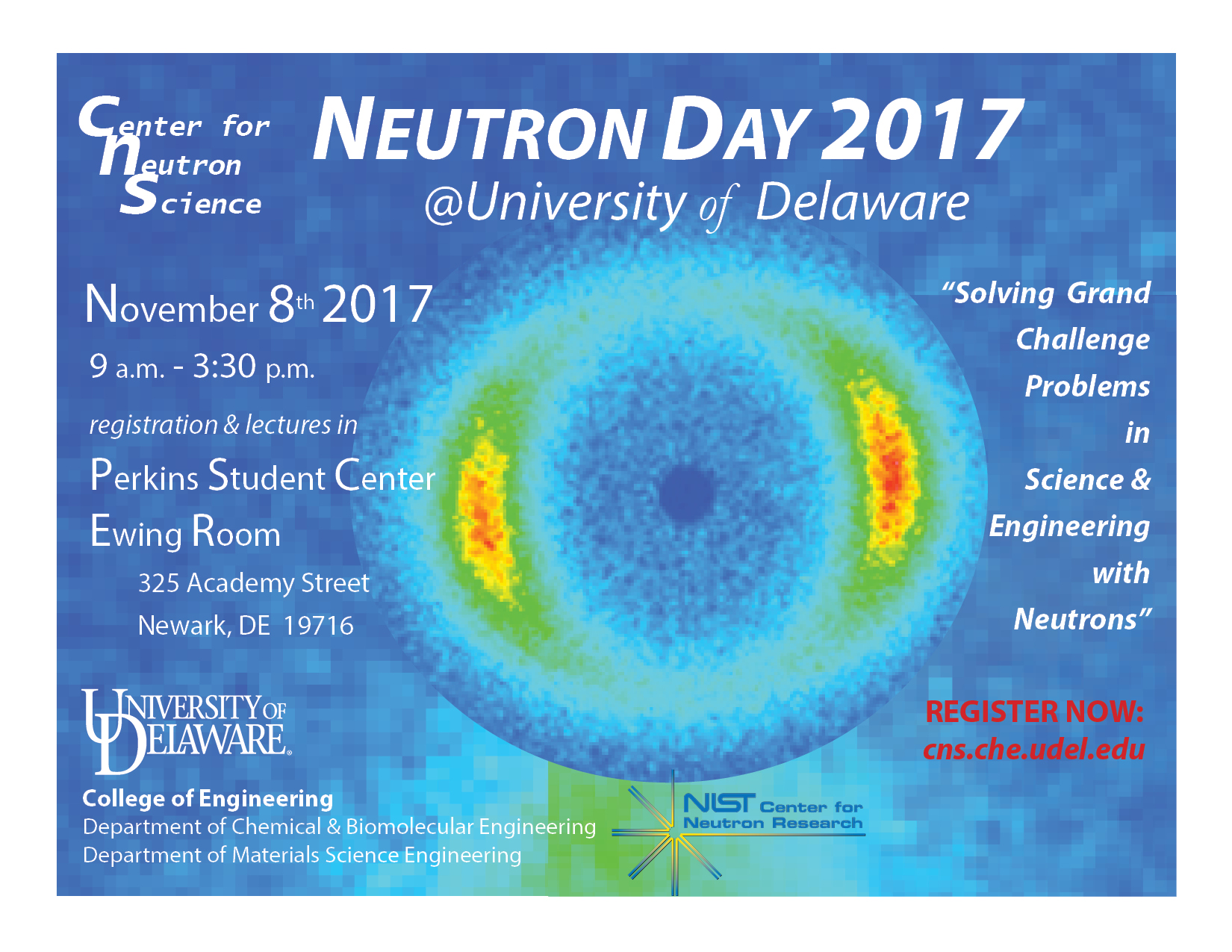
Neutron Day 2017 at Perkins Student Center, Ewing Room on November 8, 2017 from 9:00 a.m. – 3:30 p.m.
November 8, 2017, 9:00 a.m. – 3:30 p.m., Perkins Student Center, Ewing Room, 325 Academy Street, Newark, DE 19716
2017 Neutron Day Program, Parking Map & Building Locations: Click Here
Poster Presentation List: Click Here
Sponsored by the Center for Neutron Science
NIST Center for Neutron Research (NIST-NCNR)
University of Delaware College of Engineering
Department of Chemical & Biomolecular Engineering
Department of Materials Science & Engineering.
Center for Neutron Science, University of Delaware, and NIST Cooperative Agreement beginning September 1, 2017
Executive Summary
We propose a cooperative agreement between the Center for Neutron Science (CNS) at the University of Delaware (UD) and the NCNR to focus on advancing neutron scattering metrology through the use of SANS, VSANS, Neutron Reflectometry and NSE for research addressing grand challenges in the areas of sustainable energy, human health, nanomaterials as well as engineering the tools of scientific discovery. The goals of this cooperative agreement include the promotion and development of the use of neutron scattering science by scientists at the NCNR, NIST and the broader community in science and engineering, including macromolecular, colloid, and condensed matter science and chemistry. The seven faculty, nine NIST staff and 12 doctoral students and postdocs currently or proposed to be funded by the CNS have significant, collective experience using neutron scattering in research, and in the design, development, maintenance and optimization of neutron scattering instrumentation. The PI (Wagner) has directed the CNS at UD for a decade, is a fellow of the Neutron Scattering Society of America, was elected to the National Academy of Engineering and the National Academy of Inventors, is a regular user of the NCNR and contributes to NCNR activities and the development of neutron scattering instrumentation world-wide. Collectively, the faculty have trained over 100 doctoral students and postdoctoral scientists in neutron scattering science and have an extensive scientific publication record with high visibility, as also evidenced through many professional awards, and numerous plenary and keynote invited lectures. Many UD doctoral students are or have been in residence at the NCNR for a significant fraction of their doctoral dissertation, which stems from strong, existing collaborations with NCNR scientists, including many co-publications. At least three UD students and postdocs have recently gone on to become NRC postdoctoral fellows at the NCNR. n-SOFT research staff and industrially supported postdocs at the NCNR in collaboration with n-SOFT are a consequence of UD CNS research. The UD CNS has trained generations of undergraduate, graduate and postdoctoral students in neutron scattering methods at the NCNR, and many continue using these facilities as part of their current careers in academia and industry.
The nine, staff to be supported under this cooperative agreement have distinguished accomplishments at the NCNR, making significant contributions to the NCNR’s new data acquisition software (NICE), the development of VSANS, as well as significant scientific advances in soft matter using NCNR resources. The beamline scientists will support the SANS, USANS, VSANS and reflectometry instruments. The beamline scientist Dr. Yun Liu is also a Research Associate Professor at UD and as such, serves as the primary thesis advisor and as co-advisor for a number doctoral students, lectures on neutron scattering at UD and other Universities, as well as teaches at the NCNR summer school. The computer scientists and engineers support NICE and the computational infrastructure of the NCNR more broadly. The mechanical design and draftsman and research scientists are integral to the design, construction, and commissioning of the new VSANS instrument (planned 2018). This proposal also includes a novel collaboration with NCNR staff to develop new interfacial rheology-neutron reflectometry sample environment that will be made available to the broader scientific user community.
The UD faculty, beamline staff scientists, graduate students and postdocs are uniquely qualified to conduct the proposed research activities and to provide excellent research assistance to U.S. neutron researchers using the NCNR. The new sample environments and data analysis methods developed in this proposed work will be made available to promote neutron scattering science more broadly through the NCNR. The close proximity of UD to NCNR, extensive track record of collaborative research, publication, and teaching jointly between NCNR and UD scientists and students greatly facilitate the strong integration of the staff into the activities of the NCNR as described in the management plan. UD is also providing special, dedicated human resources to support the UD/NCNR staff, who can effectively meet the employment needs of the proposed staff. UD students, postdocs and faculty will be in residence at the NCNR during the course of this project and will contribute to the education and support of U.S. researchers using NCNR facilities. This includes expanding our K-12 activities by providing more and improved learning modules for high school science teachers through UD’s Learning Library, which were developed by UD CNS students to educate high school students in the basics of neutron scattering and its uses. CNS faculty also offer a popular graduate course in Scattering Methods in Soft Matter that will be regularly offered during the execution of this cooperative agreement, and also hosts the highly regarded biannual “Neutron Day”, which is a regional celebration of neutron science. Importantly, UD graduates educated in neutron scattering methods and science have gone on to employment at NCNR and NIST more broadly, such that this talented pool of doctoral students and postdocs to be supported under this cooperative agreement are a source of expertise for future staffing.

